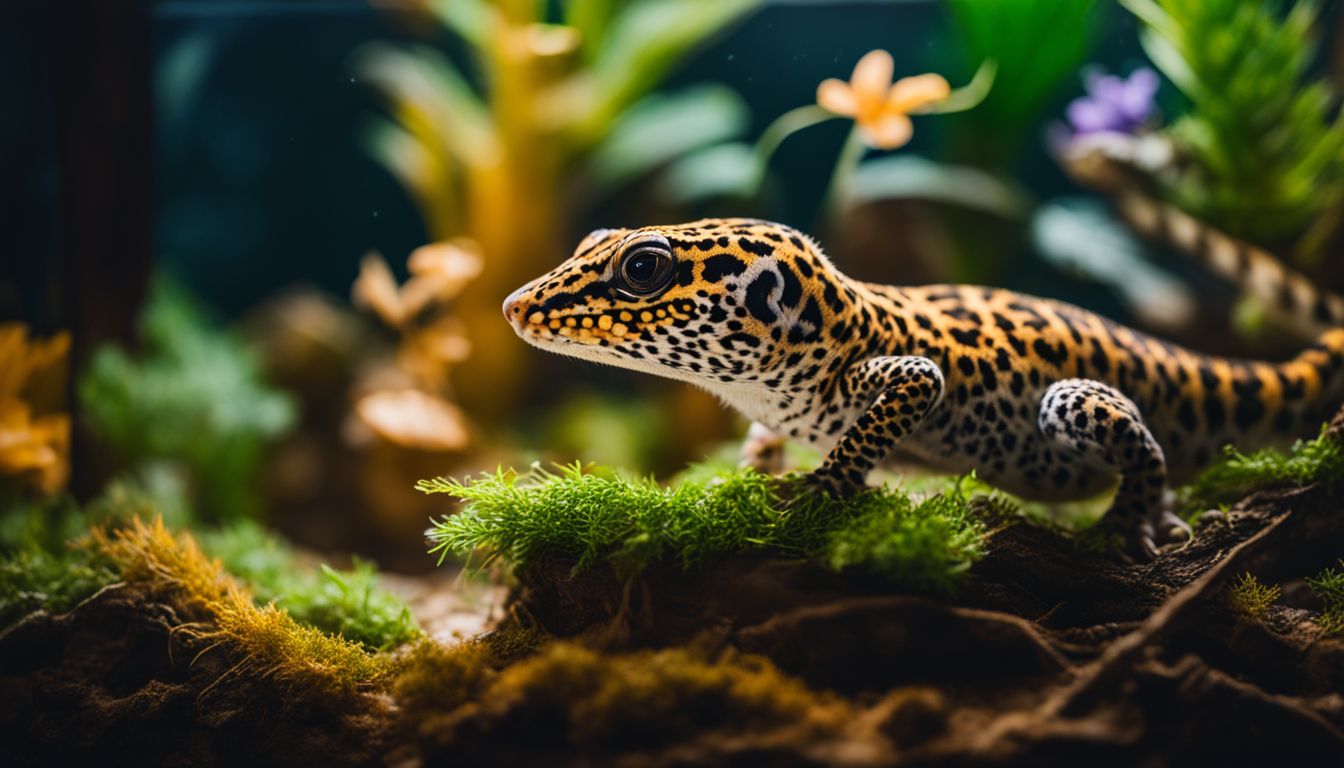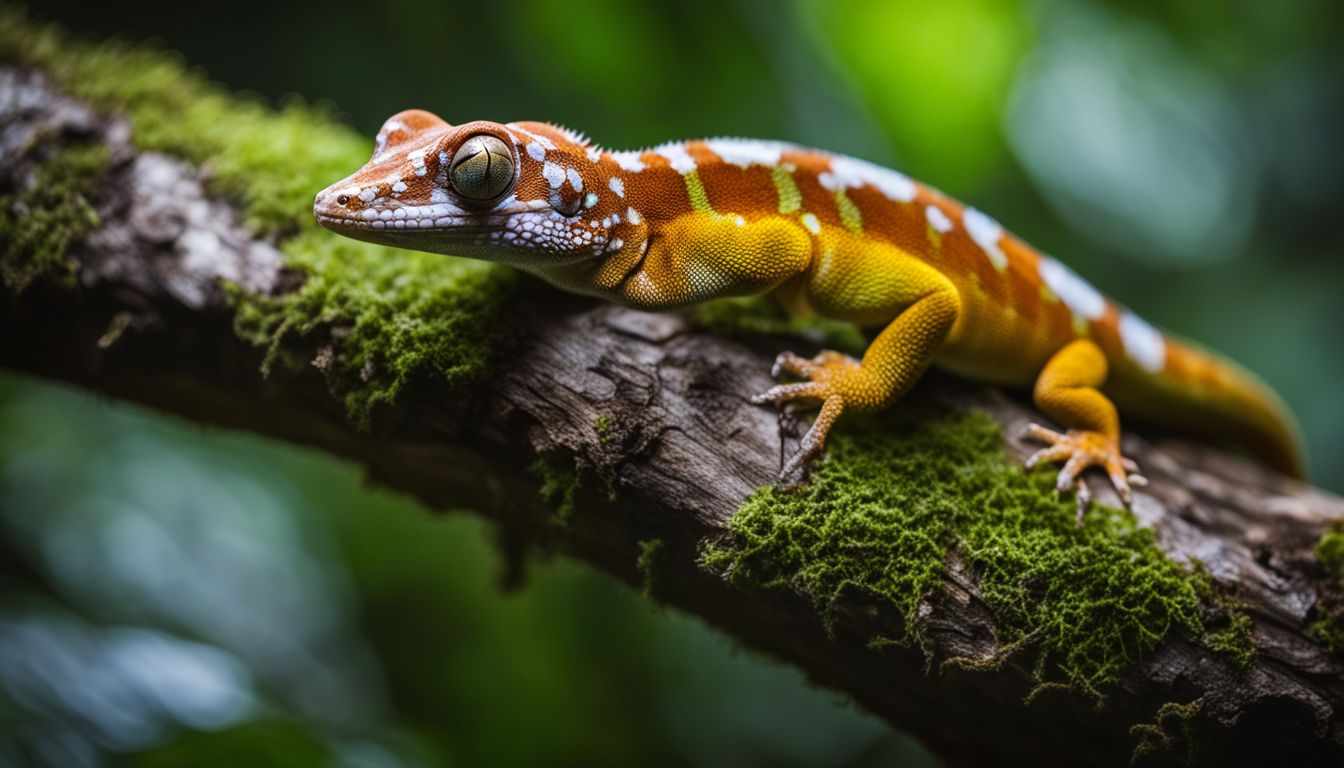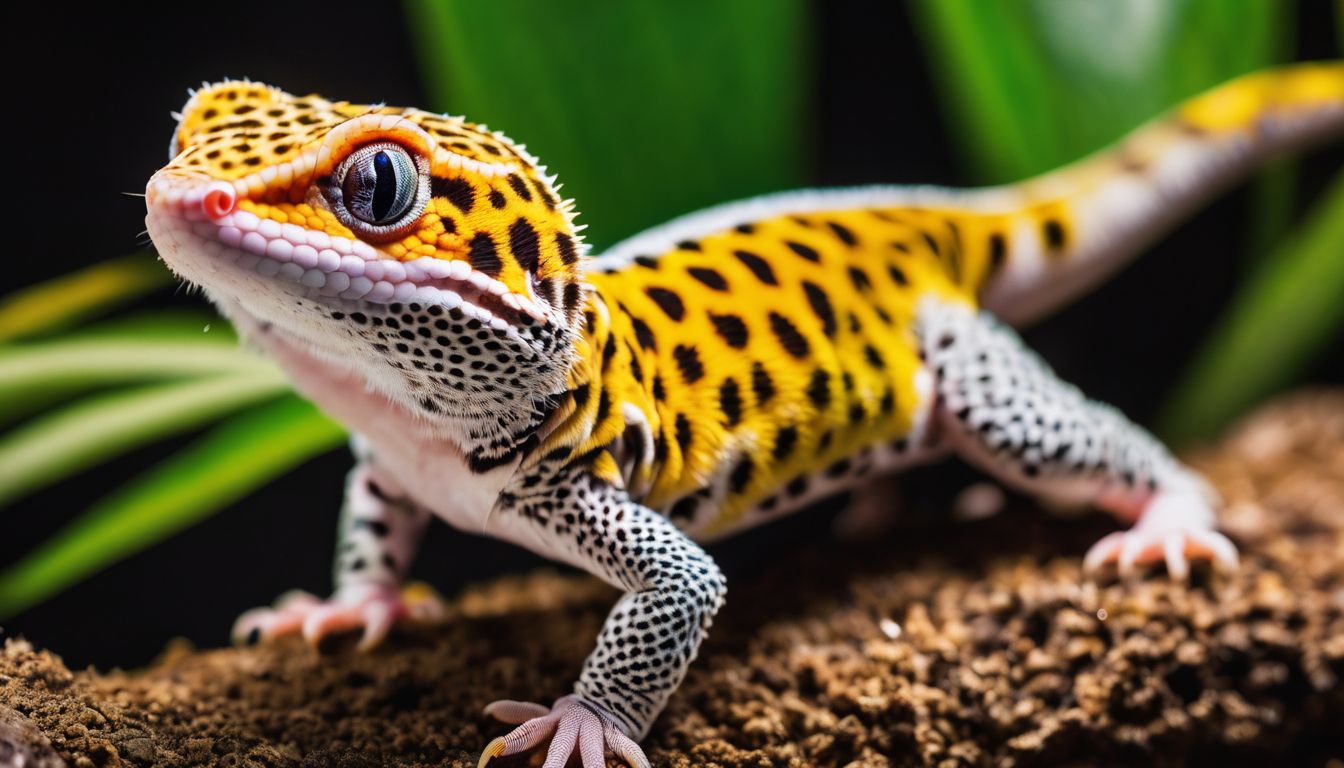Are you curious about how your leopard gecko navigates the twilight world of its terrarium? As nocturnal creatures, these fascinating lizards have stirred up questions among pet owners and reptile enthusiasts alike.
Many wonder if their beloved pets can see well in the dark or if they’re simply fumbling around. One exciting fact is that leopard geckos aren’t just stumbling in the shadows; they possess incredibly sensitive eyes, allowing them to detect movement and hunt with precision under the cover of night.
Our journey through this blog will unveil the mysterious nocturnal vision of leopard geckos, comparing it even to our own human sight. You’ll discover how these nimble hunters use their remarkable eyesight to thrive after sundown and how you can support their natural behaviors as a caring pet owner.
Get ready for eye-opening insights that will deepen your understanding and appreciation of your small companion’s world! Keep reading – there’s so much to see!
Key Takeaways
- Leopard geckos have excellent night vision, equipped with specialized cells called rods that help them detect motion and navigate in low light conditions.
- Compared to humans, leopard geckos are up to 350 times more sensitive to light and can function normally with just starlight, making them efficient hunters in darkness.
- Providing appropriate lighting conditions, feeding practices at night, and utilizing technological aids such as night vision cameras and non-disturbing lights are essential for supporting the well-being of pet leopard geckos.
The Nocturnal Eyesight of Leopard Geckos

Leopard geckos are nocturnal creatures with excellent night vision, allowing them to see in low light conditions. Their eyes are equipped with specialized cells called rods that help them detect motion and navigate their environment in the dark.
Understanding Their Night Vision Capabilities
Gecko eyes are special because they let in a lot of light. This helps leopard geckos see very well when it’s dark. Their large pupils open up wide to catch more light, and their retinas have unique cells called rods that are good at seeing in low light.
These rods give them the power to spot tiny things moving even on the darkest nights.
They also have something like a mirror inside their eyes. This “mirror” bounces back the light that comes into their eyes so they can use it again. Because of this, geckos can see almost as if it were daytime, even when there’s very little light from stars or the moon.
They can hunt for bugs and stay safe from other animals without any trouble after the sun goes down.
The Role of Rods in Gecko Night Vision
Knowing how leopard geckos see at night leads us to discover the special parts in their eyes called rods. These rods are super important for night vision. They make sure that geckos can catch every little bit of light, even when it’s really dark.
The more rods they have, the better they can see at night.
This is why leopard geckos are great hunters after the sun goes down. Their eyes let in lots of light and reflect it too, kind of like having built-in night goggles! With all these cool eye tricks, leopard geckos have a big advantage over other animals when looking for food or staying away from danger in the dark.
Comparing Gecko and Human Vision

Geckos and humans have different sensitivities to light, with geckos being adapted for lowlight conditions. Their color perception is also different from that of humans, allowing them to navigate and hunt effectively at night.
Sensitivity to Light: Geckos vs. Humans
Leopard geckos have eyes that are adept at functioning in low-light conditions, significantly surpassing human night vision capabilities. To understand the stark differences, let’s compare the sensitivity to light between leopard geckos and humans.
| Aspect | Leopard Geckos | Humans |
|---|---|---|
| Pupil Size | Large and vertical, adjusting to let in more light | Round and smaller, less capable of wide dilation |
| Retina Composition | Rods dominant, enhancing night vision | Cones and rods balanced, favoring color vision |
| Light Sensitivity | Up to 350 times more sensitive than humans | Less sensitive, requiring artificial light at night |
| Vision in Starlight | Can function normally with just starlight | Struggle to see, typically need additional light sources |
| Adaptation to Darkness | Quick adaptation, efficient hunting in low light | Take longer to adapt, often impaired in darkness |
These striking differences in vision highlight the leopard gecko’s superior night-time capabilities. Understanding these contrasts helps us appreciate the unique adaptations of these nocturnal creatures. Their capacity to perceive the world in darkness is not only fascinating but also essential to their survival.
Moving beyond their remarkable vision, let’s delve into the color perception of leopard geckos to see how they interpret their vivid world.
Color Perception in Leopard Geckos
Leopard geckos can see colors, but not as vividly as humans. Their color vision is more limited. They are believed to have dichromatic vision, which means they can perceive two primary colors: blue and green.
Research suggests that their ability to see red or orange colors is minimal. This doesn’t affect their hunting abilities since their prey, such as insects, often blend into the background due to low light conditions.
Therefore, leopard geckos rely more on movement and contrasts rather than color when hunting for food.
Caring for a Nocturnal Pet
“Providing Appropriate Lighting Conditions: Leopard geckos need a day-night cycle, so ensure they have access to low-intensity ambient lighting during the night. Night-Time Feeding Practices for Leopard Geckos: Feed your gecko at night when they are most active and alert to ensure proper nutrition and digestive health.”.
Providing Appropriate Lighting Conditions
Leopard geckos need proper lighting to maintain their health. They require both light and darkness in captivity for a steady day-night cycle, similar to their natural habitat. Here’s how you can provide the right lighting conditions for your leopard gecko:
- Use a low – wattage heat bulb during the day to create a warm basking spot.
- Utilize a full – spectrum UVB light to mimic natural sunlight and aid in calcium absorption.
- Place the lights on a timer to ensure consistent day and night cycles.
- Provide hiding spots to allow your gecko to retreat from the light when needed.
- Limit exposure to bright, direct light as it can stress your gecko.
Night-Time Feeding Practices for Leopard Geckos
Feeding leopard geckos at night is important because they are nocturnal animals, and this is when they are most active. Here’s how to properly feed your leopard gecko at night:
- Offer live prey such as crickets or mealworms, as hunting and catching prey stimulates natural behaviors.
- Use a shallow dish for feeding to prevent the prey from escaping and provide easy access for your gecko.
- Dust the insects with calcium and vitamin supplements before offering them to ensure your gecko gets adequate nutrition.
- Remove any uneaten prey in the morning to maintain a clean and hygienic environment for your pet.
Technological Aids for Observing Geckos at Night
To observe your leopard gecko at night, you can use night vision cameras and non-disturbing lights to get a better look at their nocturnal activities. These tools can provide valuable insights into your pet’s behavior and help you ensure their well-being during the nighttime hours.
Utilizing Night Vision Cameras
Leopard geckos are active at night, making it challenging to observe their behavior with the naked eye. Night vision cameras offer a solution by capturing clear footage in low-light conditions.
These cameras utilize infrared technology, which is sensitive to heat and movement, allowing you to monitor your gecko’s nocturnal activities without disturbing them. With the use of night vision cameras, you can gain valuable insights into your gecko’s behavior and ensure they are thriving in their nighttime environment.
Understanding leopard gecko’s nocturnal behaviors becomes easier with the aid of non-disturbing lights coupled with night vision cameras. These tools provide an opportunity to witness natural behaviors such as hunting and exploring without disrupting their nighttime routine.
The Use of Non-Disturbing Lights
Leopard geckos are sensitive to light, so it’s essential to provide non-disturbing lighting in their habitat. Using red or blue lights at night can help them feel secure and maintain their natural nocturnal behavior.
Unlike humans, leopard geckos don’t perceive red light well, making it ideal for observation without disturbing their activities. UVB lighting is also important for their calcium absorption but should only be used during the day.
By utilizing non-disturbing lights such as red or blue lights during the night and ensuring appropriate UVB lighting during the day, you can create a suitable environment that supports the natural behaviors and health of your pet leopard gecko.
Conclusion
In conclusion, leopard geckos have remarkable night vision due to their highly developed eyes. Implementing appropriate lighting conditions and feeding practices will ensure the well-being of your nocturnal pet.
Consider using technological aids such as night vision cameras or non-disturbing lights for observing geckos at night. By understanding and catering to their unique visual capabilities, you can provide a comfortable environment for your leopard gecko, enhancing both their welfare and your enjoyment as a pet owner.
If you’re intrigued by these fascinating creatures, exploring further resources on caring for them will deepen your knowledge and connection with these amazing nocturnal animals.
If you’re considering adding another reptilian companion to your home, learn about the costs associated with gargoyle geckos as a potential option.
FAQs
1. Can leopard geckos see in the dark?
Yes, leopard geckos have good night vision due to their large eyes and special retinas that can capture low light.
2. What do leopard geckos use their night vision for?
Leopard geckos use their night vision to hunt for food, navigate their environment, and stay alert to potential predators during the nighttime.
3. Are there differences between a leopard gecko’s day and night vision?
Yes, while they are not completely blind during the day, their eyes are more adapted to low light conditions which make them more efficient at seeing in darkness.
4. Do leopard geckos need additional lighting at night if they already have good night vision?
Additional lighting may disrupt their natural behavior as nocturnal animals; therefore, it is generally recommended to provide a low-wattage red or blue bulb for viewing purposes only.
5. How far can a leopard gecko see in the dark?
Leopard geckos have limited long-range sight but can detect movements and objects within close proximity even in very dim lighting conditions.




